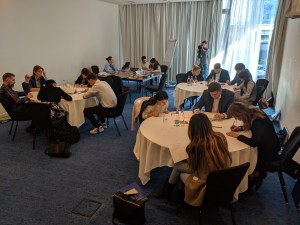I’ve had numerous conversations in recent months about the language used in and around mediation and other alternative forms of dispute resolution. Conciliation and mediation are used interchangeably in Georgia, as they often are in the UK, but in many places around the world they have different meanings. This is something that I have increasingly noticed people find confusing. It gets worse when you start to debate whether or not your style of mediation is facilitative, evaluative or transformative, at which point people not involved in the profession often glaze over while ‘mediation geeks’ get excited about when they might employ each approach.
For my part, I think it would be better, in promoting the use of mediation (and other forms of ADR), for people to use consistent and, by preference, simpler terminology. This is a big enough topic for Scottish Mediation to have committed the whole of their Mediate 2019 conference this November, and titled it The Words We Use. It should be a fascinating discussion, and perhaps we can start to find some consensus.

Participants in the ITCILO Conciliation of Labour Disputes course in Tbilisi, April 2019, complete their final assessments.
Mediation as a voluntary process
A consistent theme raised by the participants in Georgia, many of whom were already experienced practicing mediators, related to the problems they face due to conciliation of collective disputes being a statutory step without which industrial action by a union would be illegal. This means people go into it as a necessary step in escalating their dispute rather than primarily as a means to resolve it. My main experience of compulsory mediation comes through the Employment Tribunal application system and the Scottish Sheriff Courts.
In the former, an applicant to the Tribunal has to go through ACAS Early Conciliation in order to get a code that allows them to complete the online ET application form. When this system was introduced, it was tied to applicants also paying a fee to the Tribunal service. As a result, few respondents (the employer against whom the Tribunal application is raised) had any incentive to engage with the process: regardless of the merits (or lack thereof) of the case, why conciliate when the applicant may not have enough money to submit their claim in the first place? The removal of the fees has resulted in an increasing number of applications people who were inhibited from applying because they couldn’t afford the fee. However, many respondents still seem reluctant to engage with the conciliation, and it’s difficult not to see that as a factor of it simply being part of the process rather than being seen as a genuine opportunity to find a mutually acceptable outcome.
With the Sheriff Courts, I have found many of the parties not yet ready to mediate, but having been ordered to do so. A significant majority have reached a agreement, but this has often involved significant preparatory work so they are better aware of the process they are entering and the opportunity it represents to have some control of the outcome. In such cases, the mediation is, however, genuinely voluntary so provides a real alternative to presenting their case in court with the associated stress, time and costs.
What does ‘success’ look like?
Following on from the above point, some of the mediators in Tbilisi were slightly despondent about their chances of success when starting a mediation. If the conciliation is just “part of the process” what are the chances it can be successful.
But what IS success in a mediation?

It’s tempting to see a successful mediation only as one that ends in agreement, but that’s not always possible, especially with collective disputes where Politics and politics are in play. In that sense, it could be a success to help the parties better understand the nature of the disagreement they’re having. Or to help them identify options for settlement, without them having actually determined any preference between them. Or simply to understand their own needs (as opposed to wants) as well as those of the other party.
Ultimately, the role of the mediator is to help parties on their journey to a mutually acceptable outcome. If that is at the start of the journey, perhaps it is success enough to point people in the right direction, while another mediator, later in the journey, might see them safely home.
* The training was commissioned by the International Training Center of the International Labour Organisation
Want to learn more please contact us